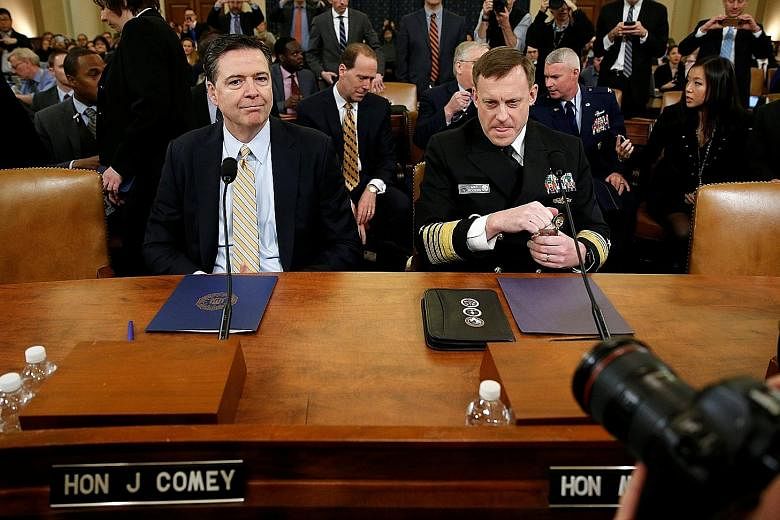WASHINGTON • FBI director James Comey has dealt US President Donald Trump a stinging rebuke at a time of acute political vulnerability for the White House.
In an opening statement before the House Intelligence Committee on Monday, Mr Comey confirmed that the Federal Bureau of Investigation is probing Russia's interference in the US presidential election last year, and whether any of Mr Trump's associates collaborated with Russian President Vladimir Putin's government.
On another day, in another time, that would be the bombshell.
But Mr Comey said more, establishing that Mr Trump's charge that his predecessor wiretapped him was false. Under questioning from lawmakers, Mr Comey insisted that there was "no evidence" to substantiate the claims made by Mr Trump on Twitter on March 4.
There was nothing to prove Mr Barack Obama had phones tapped at Trump Tower, subverted safeguards enacted to prevent abuses of power and protect Americans from foreign electronic surveillance, or violated rules of a decades-old intelligence alliance and solicited a foreign ally to carry out the spying.
-
'Putin hated Clinton'
-
Three key takeaways from the testimony of FBI director, Mr James Comey, on Monday:
1. There is no evidence that Mr Barack Obama tapped Mr Donald Trump's phones. Mr Comey quickly confirmed where the last few weeks seemed to have been leading: There is no evidence to back up Mr Trump's claim that Mr Obama ordered wiretapping of his Trump Tower phones.
2. Connection between Mr Trump's campaign associates and the Russian government. The FBI rarely acknowledges publicly the existence of an ongoing investigation except, in Mr Comey's words, in "unusual circumstances".
On Monday, the FBI chief told Congress and the world that, yes, the agency is investigating Russia's meddling in the United States election. In addition, it is probing whether there was any coordination between the Trump campaign and Russia, and "whether any crimes were committed".
3. Russian interference in US elections was to hurt Mr Trump's opponent Hillary Clinton. Under questioning, Mr Comey confirmed the intelligence agencies' findings that the goal of Russian interference in the election was to hurt Mr Trump's opponent in the presidential poll, Democrat Hillary Clinton, a particular target of the ire of Russian President Vladimir Putin.
"To be clear, Mr Conaway, we all agreed with that judgment," Mr Comey said, addressing Congressman Mike Conaway.
But Mr Conaway repeatedly probed the agencies' additional conclusion - that Russia and Mr Putin also wanted to help Mr Trump.
Mr Comey stated what he suggested was obvious: "Putin hated Secretary Clinton so much, that the flip side of that coin was he had a clear preference for the person running against the person he hated so much."
WASHINGTON POST, NYTIMES
"I'm not going to try and characterise the tweets themselves," Mr Comey said.
"All I can tell you is we have no information that supports them."
Taken in sum, the director, who boosted Mr Trump's political fortunes in the closing days of the presidential campaign by acknowledging a probe was reopened into rival Hillary Clinton's use of private e-mail, dealt the President one of the worst political blows of his young administration.
The damage comes at perhaps the worst possible time. It is a crucial week for the White House, with Senators weighing the nomination of Mr Neil Gorsuch to the Supreme Court and the House set to vote on Mr Trump's preferred plan to repeal and replace Obamacare.
That vote is certain to be close.
House Republicans, already skittish about a plan that manages to institutionalise government involvement in the healthcare sector while risking the coverage of their constituents, are certain to be taking stock of Mr Trump's political capital.
A Gallup poll released on Sunday showed Mr Trump's approval rating at 37 per cent, down eight percentage points from a week earlier.
It is lower than Mr Obama's at any point in his presidency.
A Congressional Budget Office review found that under the healthcare plan Mr Trump endorsed, 24 million Americans would lose coverage over the next decade.
A federal court again struck down his attempt to block travel from six majority-Muslim nations.
A frosty meeting with German Chancellor Angela Merkel, and a spat with Britain after the White House highlighted a Fox News commentator's charge that a British intelligence agency may have helped Mr Obama spy on Mr Trump, only deepened concerns about the latter's competence.
Monday's hearing made clear that the question of Russian interference in the election will continue to trouble the Trump administration. Both the House and Senate Intelligence Committees will hold more public hearings in coming weeks, and closed-door sessions with intelligence chiefs to discuss classified data on the probes.
BLOOMBERG, AGENCE FRANCE PRESSE

